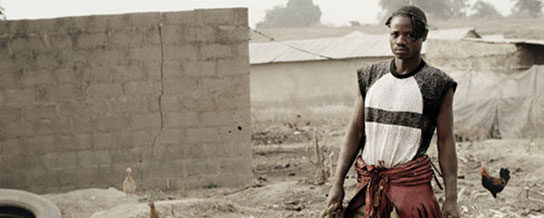Lagos, Nigeria: Then and Now
I’m driving through the back roads of upstate New York. Secondary roads named for the […]

Lagos, Nigeria: Then and Now
I’m driving through the back roads of upstate New York. Secondary roads named for the […]

I’m driving through the back roads of upstate New York. Secondary roads named for the families that still live near them. Single-lane roads on which you’re passed by pickup trucks with gun racks. Roads leading past signs that read, “Jesus loves you–full range of bait and tackle.” Passing through one-stop-sign towns like Upper Lisle, NY, I’m blasting Sir Shina Peters & His International Stars from the new installment of Strut Records’ Nigeria 70 compilation series of monstrously heavy, funky Afrobeat.
Realizations come at every turn. First, it’s striking that this music older than I am should seem so boldly new: The guitar riffs that loop like today’s back-to-basics, roughshod sampling styles; the impossibly tight, electronic snare drum; the “retro” purity of a simple synthesizer. And it’s striking that here, in one of the whitest and most rural parts of the Northeastern United States, music made by urban Africans more than 30 years ago should shake with such ferociously contemporary, or perhaps such essentially timeless, fervor. “This is me, Tete Muo Bu Muo,” Tony Tete Harbor announces at the beginning of a song, “expressing [his] loneliness.” Harbor’s band, The Star Heaters of Nigeria, begin a melancholy rhythm and impoverished moan that I’m certain could bear meaning to some upstate pickup-truck pilot, driving past the farm his grandparents once owned, on a road that shares his name, to a job at a cafeteria in Cortland or a Starbucks at Cornell.
But therein lies the magic of Afrobeat. Much like reggae or hip-hop, it’s music that has escaped its temporal and cultural bonds to become something bigger than its players and singers, more meaningful even than its own sound and vision. The truth of Afrobeat is spoken in rhythms and contexts, irrespective of linguistic and political boundaries. It’s a truth of the rebelliousness of survival against social, cultural, and economic odds, as sermonized on Eddie Okwedy’s collection-ending “Happy Survival.” It’s a truth similarly expounded upon by Lagos Shake, a new collection of contemporary electronic remixes and re-cuts of Tony Allen’s modern Afrobeat classic, Lagos No Shaking.
Lagos Shake goes to prove that what reggae and dub were to the punk and post-punk generations, Afrobeat might be to the globalized post-electronic funk pandemic. As punk found limitless rebellious potential in reggae’s translucent rhythms, the likes of U.K. grime-ists Newham Generals and baile funkers Bonde Do Role dig into Allen’s rhythm-scapes to conceive a new non-verbal rhetoric of frenzied catharsis. Egyptian jazz master Salah Ragab and Chicago’s Hypnotic Brass Ensemble bring a heavy, spacey, Sun Ra vibe to Allen’s work, while Carl Craig and Diplo twist and tweak tunes into fader-pushed rhythmic obscenities. The overall effect is one of possibilities and options contains within a rhythmic language that, while once so new and bold, now seems not only familiar, but universally vital–almost circulatory in its relationship to contemporary music’s existence.
That Afrobeat would survive past the heyday of its singular driving force, Fela Kuti, was never assured. That it would flourish as never before under the legacy he left–his drummer and co-conspirator Tony Allen, and his children including Femi Kuti–is even more surprising. But with the stream of re-releases like Nigeria 70: Lagos Jump, and an ever-expanding global scene of critically lauded new bands (Antibalas, Kokolo, NOMO, Mifune–all just in the Eastern U.S.), what should no longer be surprising is that Afrobeat has become the shibboleth that dub once was; the password to a vast musical underground, be that on the streets of São Paolo or the clubs of London or New York. Long live the Punky Afro Party.

